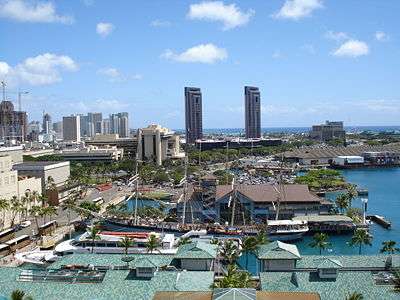Aloha Tower
|
Aloha Tower | |
|
The Aloha Tower has been greeting vessels to port at Honolulu Harbor since September 11, 1926. | |
| Location | Honolulu, HI |
|---|---|
| Coordinates | 21°18′25″N 157°51′57″W / 21.30694°N 157.86583°WCoordinates: 21°18′25″N 157°51′57″W / 21.30694°N 157.86583°W |
| Built | 1926 |
| Architect | Arthur L. Reynolds |
| Architectural style | Late Gothic Revival, Art Deco[1] |
| NRHP Reference # | 76000660 [2] |
| Added to NRHP | May 13, 1976 |

The Aloha Tower is a lighthouse that is considered one of the landmarks of the state of Hawaii in the United States. Opened on September 11, 1926 at a then astronomical cost of $160,000,[3] the Aloha Tower is located at Pier 9 of Honolulu Harbor. It has been, and continues to be, a guiding beacon welcoming vessels to the City and County of Honolulu. Just as the Statue of Liberty greeted hundreds of thousands of immigrants each year to New York City, the Aloha Tower greeted hundreds of thousands of immigrants to Honolulu. At 10 stories and 184 feet (56 m) of height topped with 40 feet (12 m) of flag mast, for four decades the Aloha Tower was the tallest structure in Hawaii.[3] It was built in the Hawaiian Gothic architectural style.
Attack on Pearl Harbor
When the attack on Pearl Harbor came on December 7, 1941, Coast Guardsmen from the USCGC Taney (WHEC-37) were ordered to take up defensive positions around Aloha Tower and protect it from being occupied. The Aloha Tower was painted in camouflage to disappear at night.
Redevelopment
In 1981, the Governor of Hawaii and the Hawaii State Department of Business, Economic Development and Tourism established the Aloha Tower Development Corporation. The public corporation was charged with developing the land around the Aloha Tower to benefit the state's commercial trade industry based at Honolulu Harbor while at the same time providing the residents of Hawaii with ample access to the downtown waterfront. The entire Aloha Tower Complex, as defined by the public corporation, was identified as Piers 5 and 6, Piers 8 through 23, and portions of Nimitz Highway and Iwilei.
Museum marketplace
In 1982, the Hawaii Maritime Center was opened near the Aloha Tower in an old royal pier to present the history of Honolulu Harbor and the relative industries it served. In 2002, the Hawaii Maritime Center became an incorporated institution of the Bishop Museum. The center was closed to the public on May 1, 2009.[4]
Docked at the royal pier is the Falls of Clyde, a historic shipping vessel.
Recent developments
The Aloha Tower Development Corporation continues its work today with plans to modernize the facilities and infrastructure in and around the Aloha Tower Complex. Its most significant hurdle is to find a way of making travel through Nimitz Highway more efficient. In 2004, a controversial proposal was made to construct an underground highway tunnel beneath the complex.[5] Other proposals include the establishment of streetcars, elimination of commercial high-rises in the area and increase of high-rise residential units instead. State officials want to close the parking lot fronting the Aloha Tower and destroy the adjacent Hawaiian Electric Company power plant, then fill the space with a park. In consideration of heightened security measures after 9/11, tourist access to the observation deck was restricted, but has since been reopened.
As of 2013 the shopping center and Aloha Tower itself have fallen into a state of disrepair, most of the store fronts are now gone and the entire mall and tower is showing damage. Many of the ships that were once tourist attractions have ceased operating, the Falls of Clyde has been stripped of her masts and is now a derelict sitting in the harbor.
The Star of Honolulu Dinner Cruise still operates out of the docks near the bars.
These Developments occurred after Hawaii Pacific University purchased the property, the University hoped to begin renovations in the summer of 2014. HPU’s plan for the 160,000-square-foot, two-story waterfront marketplace includes establishing student housing on the second floor with a multi-use complex that would house retail, dining and entertainment options on the first floor.
It is unclear what will happen with Aloha Tower itself although it is expected to continue to be protected by the state and local organizations.
Gallery
-

Docked at the Aloha Tower Complex is the Falls of Clyde, the only iron-hulled, four-masted ship in the world.
-

The Hawaii Maritime Center and the Falls of Clyde seen from Aloha Tower, looking east
-
Downtown Honolulu featuring the Aloha Tower, the Falls of Clyde, and First Hawaiian Center.
See also
References
- ↑ http://www.emporis.com/buildings/128700/aloha-tower-honolulu-hi-usa
- ↑ National Park Service (2007-01-23). "National Register Information System". National Register of Historic Places. National Park Service.
- 1 2 Foster, Jeanette (3 April 2012). Frommer's Honolulu, Waikiki and Oahu. John Wiley & Sons. p. 196. ISBN 978-1-118-07465-7. Retrieved 29 April 2012.
- ↑ "Too bad about the Hawaii Maritime Center". Visit Hawaii. 11 April 2009. Retrieved 1 August 2009.
- ↑ "Aloha Tower proposal reshaped". The Honolulu Advertiser. 19 June 2004. Retrieved 29 April 2012.
External links
| Wikimedia Commons has media related to Aloha Tower. |
- Aloha Tower Development Corporation
- Aloha Tower Marketplace
- Aloha Boat Days
- Rowlett, Russ. "Lighthouses of the United States: Hawaii". The Lighthouse Directory. University of North Carolina at Chapel Hill.

